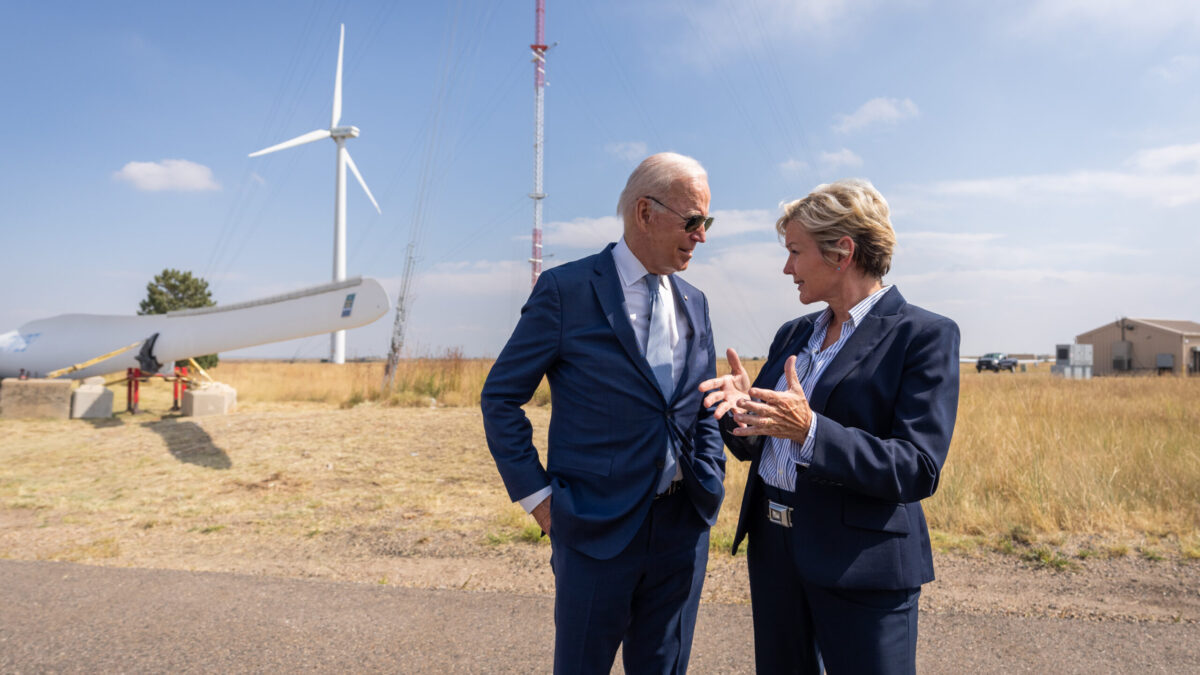As gas prices pinch Americans, quite a buzz has emerged over electric vehicles. Many ordinary Americans are lamenting both the astronomical prices at the pump and the Biden administration’s subsequent push for electric cars as he blames Russia. The corrupt press is predictably suggesting those spurned Biden critics are spinning “conspiracy theories.”
But it isn’t a conspiracy theory to point out that the White House has gas-powered Americans right where it wants them, nor is it conspiratorial to note that the administration — including President Joe Biden, Press Secretary Jen Psaki, Vice President Kamala Harris, Transportation Secretary Pete Buttigieg, and Energy Secretary Jennifer Granholm — has used the gasoline crisis it largely created to pump green dreams, including a transition to electric vehicles.
More than being completely tone-deaf to the plight of Americans who, while struggling to pay $4 a gallon for gas probably don’t have tens of thousands of dollars lying around to buy a Tesla, the Biden administration also ignores the severe shortage of microchips and scarcity of available vehicles anyway. Given those constraints, even those who can afford to buy new cars probably can’t just waltz into a dealership and be relieved of the fuel burden.
Even more, though, the whole electric vehicle debacle reveals two things: the Biden administration and other ruling class ignorance of the lives of most Americans, and Democrats’ fake concern for the environment.
Left-Wing Elites Know Nothing of America’s Pulse
The Federalist recently told the stories of Americans coast-to-coast suffering under record gas prices. These people included Dennis Johnson, a sixth-generation dairy farmer in Michigan, who now pays about $50,000 per month just for fuel to run his operation. Mason Gross has watched diesel costs trickle down and increase start-up costs for small businesses. In both cases, electric vehicles seem undesirable and unworkable.
Tyler Hake, who has owned Wash Our Windows Wisconsin for almost four years, told The Federalist how gas prices are affecting his operations too, and why electric vehicles aren’t a good solution. To run his business and haul his equipment, Hake operates two pickup trucks with 24-gallon tanks, and while he could fill each tank for about $60 last year, this year it will cost about $100 each. When he fueled up one truck for his first job this season, he spent $85 — and the tank was only partially filled.
“I’m dreading the rest of the season here if it keeps climbing,” Hake said.
“Electric vehicles are not cheap,” Hake added. “When I buy trucks, they’re typically 10, 12 years old — at least that’s what I’m looking for. You know, I’m not looking to spend $30,000 on a vehicle. And they didn’t make electric vehicles necessarily back then, especially pickup trucks. … I imagine I would be spending quite a bit more on an electric truck.”
Hake said his preference is to look for trucks from the mid-2000s that he can invest about $5,000 or $6,000 in. But even if cost weren’t a factor, functionality and durability certainly are.
“I need trucks that can hold all the equipment and can tow all the same stuff,” Hake said. “I can imagine it would be difficult to find [electric vehicles] that would be able to allow me to do the same things.”
This story repeats itself in countless industries across the country. How are lawn care and snow removal companies ubiquitous in the Midwest supposed to ditch gasoline for electric cars? Do Washington elites — especially the Biden administration, which is “all in” on its goal to achieve “100 percent clean electricity by 2035 and net-zero carbon emissions by 2050” — really expect these blue-collar workers to trade in their plow-mounted, rough-and-tumble dually diesel trucks for the soon-to-arrive, gadget-mobile electric pickups that appear better suited for a coastal dad show-and-tell than for actually working?
When these workers are 24 hours into a snow-removal job, what are they supposed to do while their trucks are recharging and the flakes are still coming down? What about independent drivers of 18-wheelers who aren’t part of, say, a Walmart or Amazon fleet?
Electric cars might have a comparable mileage range to a regular car, but what about charge time? For truck drivers, already burdened by countless regulations, dead time adds up. The same goes even for people in sales who put on hundreds of miles driving across their territories day in and day out.
Perhaps, more importantly, do these workers want to switch to electric? Does it pass their personal cost-benefit calculations? Climate-extreme elitists never bothered to ask — and don’t care about the answer.
Where Do You Think EVs Get Their Electricity?
This entire conversation is nonsensical, especially because electric vehicles aren’t actually good for the planet. The Biden administration and other coastal elites can bloviate all day about “environmental justice,” whatever that means, but it’s all just hot air.
Do you know where the electricity for “clean” vehicles comes from? Most of it comes from fossil fuels, with one 2020 study showing that these nonrenewables are the primary EV energy source in 43 of the 50 states.
“[O]ne of Tesla’s Supercharger stations was reported to get 13 percent of their energy from natural gas and 27 percent from coal,” which are both fossil fuels, Federalist intern Alasdaire Fleitas noted on Wednesday. “Power plants burn coal to generate electricity to power electric cars and emit a higher fossil fuel footprint than the left would care to admit.”
Democrats love to chatter about “emissions,” but while electric vehicles are great for virtue-signaling because they avoid the exhaust given off on the back end by gas-powered cars, they emit greenhouse gases on the front end by running on energy derived from fossil fuel combustion at a power plant.
And this is to say nothing of how electric cars increase our reliance on super-polluters like China for battery and other manufacturing.
None of Your Business
The Democrats pushing electric cars while scurrying around to speeches and fundraisers in private jets and fleets of SUVs clearly don’t really care about the planet, and they don’t care about the lives of normal Americans.
But it’s more than hypocrisy. Using gas prices to push vulnerable Americans into their green policy goals is also coercive. And bragging about “zero emissions” by pushing expensive cars that are still built on fossil fuels and pollution is completely dishonest.
It’s also ignorant. Americans have work, personal responsibilities, and expenses that lead them to assess costs and benefits and invest in the best vehicles to help them provide for their families and their customers. They don’t want electric vehicles; they want a $5,000 pickup truck, and they have a good reason for it. Stop ruining their lives.









